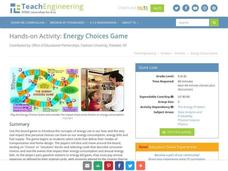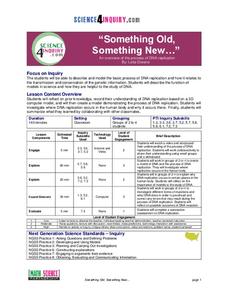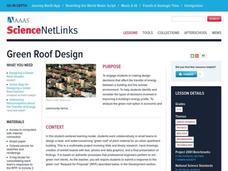PBS
The Roosevelts: An Intimate History—Snapshot Lessons
The Roosevelt family was one of the most influential and prominent political forces in the 20th century, leaving behind a wide-ranging legacy of conservation, progressivism, and economic growth. Learn more about President Theodore...
Teach Engineering
Energy Choices Game
Here's a fun game on a very serious matter. Scholars play a board game to learn about personal energy use and consumption. They see how various choices affect their energy use and costs, and then apply this knowledge to brainstorm ways...
Teach Engineering
Energy in Our Lives Carousel
Don't waste any more energy trying to find a great resource on energy. The third installment of a 25-part Energy Systems and Solutions unit focuses on energy use in pupils' lives. They consider how their daily routines consume energy and...
Purdue University
Take-a-Hike
Learn about nature and health all in one set of lessons. Individuals use a scavenger hunt to record observations during a nature hike. They then complete activities to categorize their observations and rate the health of the habitat for...
Purdue University
Trees of the Midwest
All trees are not created equal. A set of three wildlife conservation lessons has learners examine the characteristics of individual trees. They look at the life cycle of the tree using a story and reference a field guide to identify...
Purdue University
Eco-llapse
A balanced ecosystem doesn't mean balanced populations. Budding scientists complete a series of activities to learn about the relationship between producers and consumers in an ecosystem. They complete the wildlife conservation...
Encyclopedia Britannica
Meta-Study: Political Brains
Are there differences in the brains of liberals and conservatives? That is the question young political scientists are challenged to answer. Class members examine studies, consider how the results are presented, and how the studies were...
Columbus City Schools
ABC: Acid Base Chemistry
Bubble, bubble, boil and trouble! What causes common substances like baking soda and vinegar to react the way they do? Welcome your junior chemists to the wonders of acid-base chemistry using a comprehensive and fun resource. Engage them...
Science 4 Inquiry
"Something Old, Something New..."
Young scientists learn about DNA replication through a video and model creation. They answer analysis questions before exploring the role of mutations and then complete a summative assessment.
Curated OER
Recycle Relay
Here is a quick activity intended to get little learners ready to conserve. They classify trash for recycling by placing items in the categories reduce, recycle and reuse. In teams the sort real life trash items into the best...
LABScI
Potential and Kinetic Energy: The Roller Coaster Lab
Ron Toomer, a famous roller coaster designer, suffered from motion sickness. Pupils design their own roller coasters, learning about potential and kinetic energy in the process. Labs focus on the importance of drop height, energy...
California Academy of Science
Fresh Solutions: Design Thinking Challenge
How do people transport fresh water long distances to ensure everyone has access to it? The final lesson in the 10-part Fresh Solutions unit encourages individuals to design their own solution, or solutions, to that very problem. Groups...
California Academy of Science
Sustainable Water Solutions: Weighing the Pros and Cons
Switching indoor water fixtures to low flow reduces water usage by more than 45 percent. This and other solutions to reduce water usage have both pros and cons. Scholars view videos of different solutions, discuss them in small groups,...
Teach Engineering
Energy and the Pogo Stick
Let your class bounce to examine the concept elastic potential energy. Individuals bounce on a pogo stick in order to calculate its elastic potential energy. Groups then compare the elastic potential energy to the gravitational potential...
Teach Engineering
Energy Storage Derby and Proposal
Small groups use the engineering design process to build and test a vehicle capable of carrying 250 grams a distance of five meters. The design must allow for the storage of potential energy and turn it into motion, allowing the...
Science NetLinks
Green Roof Design
Green roofs aren't just eco-friendly — they are literally green with trees. Groups learn about the concept of green roofs in order to be able to design one. The groups design a 5,000-square-foot green roof for a fictional apartment row...
California Academy of Science
Your Hidden Water Footprint: Defining a Problem to Find a Solution
One 17-ounce bottle of Cola requires around 46 gallons of water to produce. How is that possible? Young scientists learn about the hidden water used to produce everyday items. They research, discuss, and look for ways to reduce water...
Teach Engineering
Energy Conversions
What energy conversions occur in the operation of a device? Small groups investigate devices and the energy conversions that occur. The groups create energy flow diagrams with added conversion processes for each of the devices...
Virginia Department of Education
Aspirin Analysis
Laughter may be the best medicine, but aspirin is also important. Young chemists analyze aspirin tablets using titration in this lab experiment. They then repeat the entire experiment using a different aspirin brand.
Teach Engineering
Engineering Brainstorming
Here is a lesson that offers a great hybrid of forming new skills and using current knowledge to come up with a plan. The class brainstorms information they would need to know or already know about hybrid vehicles. They then group the...
Tech Museum of Innovation
Energy at Play
Get the ball rolling and challenge your class to figure out how to make a ball move. The instruction segment is between two STEM activities devoted to doing just that. The first is simple and involves making a ball move from some force...
Santa Monica College
The Composition of Potassium Chlorate
The third lesson in a series of 11 begins by using thermal decomposition of potassium chlorate to determine the mass percent of oxygen. Then a second activity allows scholars to demonstrate that the resulting residue is from a...
Curated OER
Recycled Paper
Sixth graders keep track of the amount of paper they consume on a daily, weekly, and monthly basis. The goal of the lesson is to have them all find ways to reduce the amount they use. Everyone creates recycled paper from old newspapers...
Curated OER
Biodiversity Debate - Stream Side Science
Role play community members who are both for and against the construction of a dam. Research the pros and cons and then hold a classroom debate. This activity ideally follows a series of stream studies, links to which are included. Use...
Other popular searches
- Wildlife Conservation
- Water Conservation
- Marine Conservation
- Conservation Issues
- Conservation of Mass
- Conservation of Energy
- Conservation of Matter
- Energy Conservation
- Conservation of Momentum
- Law of Conservation of Energy
- Soil Conservation
- Law of Conservation of Mass

























